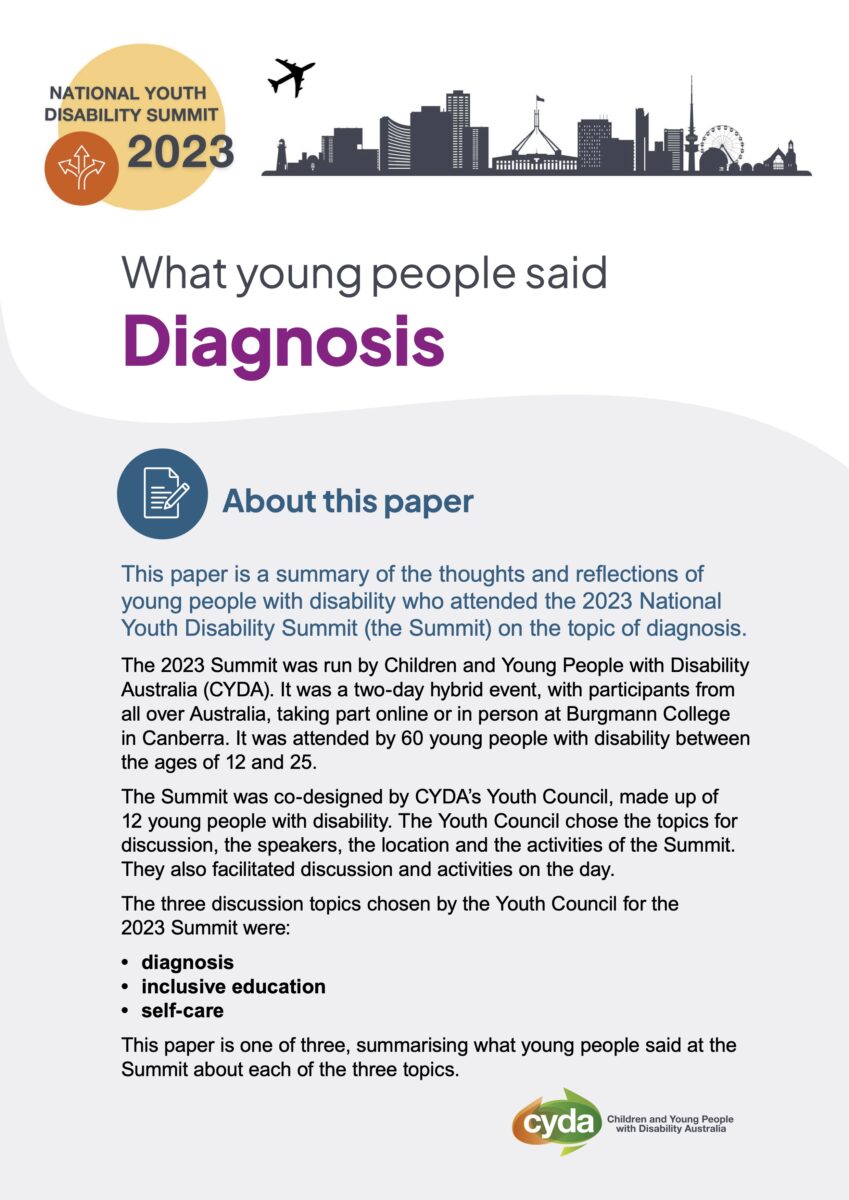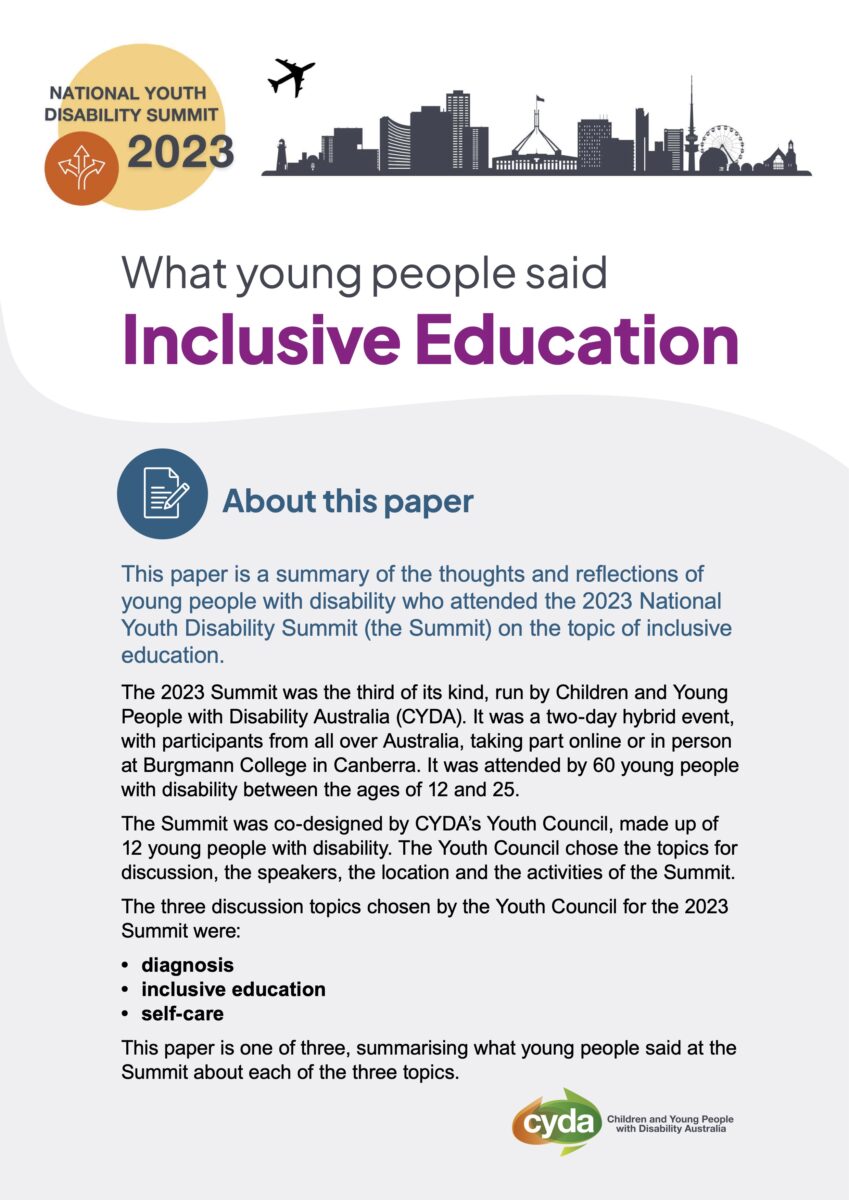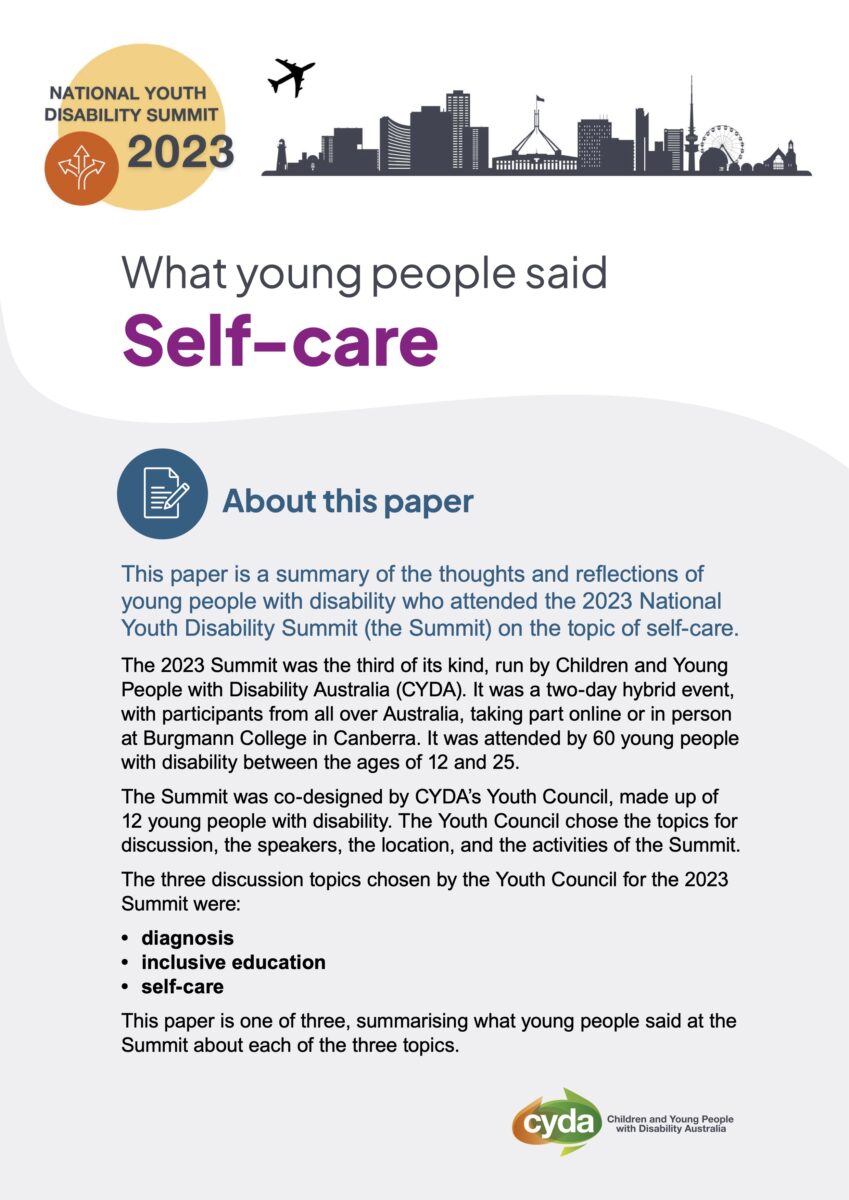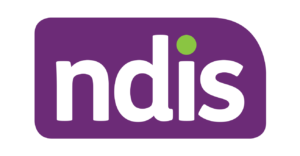What Young People Said
On This Page
About the “What young people said” papers
At CYDA’s National Youth Disability Summits in 2020 and 2023, young people with disability from across Australia came together as a community to use their voices to shape the future.
The 2020 Summit was a five-day, online event, attended by over 250 young people with disability. The 2023 Summit was two-day hybrid event attended by 60 young people with disability.
Topics covered at the Summits included:
- diagnosis
- inclusive education
- self-care
- employment
- mental health and wellbeing
- the NDIS and housing
- awareness, access and inclusion
A series of policy papers called “What young people said” were written about what was said at the Summits. You can download the papers here 👇
From the 2023 Summit
Diagnosis
“I finally had context. I had, like, an understanding of why certain things were the way they were or why I felt different, or isolated from people. So, just understanding that there wasn’t anything wrong with me was really important. It was just that I was different. And that’s okay.”
Young person with disability
Young people with disability talk about the benefits, downsides, and cultural and structural barriers to receiving a diagnosis.
Inclusive education
“A culture cannot be changed only by educating staff. Schools would be much more inclusive if my fellow classmates knew what disability is, and that it’s not a bad thing, or something to make fun of.”
Young person with disability
In discussions on inclusive education, young people with disability talked about the need for more flexible, student led approaches to education. They talked about access to inclusive education as a human right, and the need to normalise disability in classrooms for non-disabled students, to reflect the reality of disabled people, and reduce discrimination in other areas of society.
Self-care
"[T]here’s lots of people who believe [disabled people] don’t and should not be allowed to exist. So, the act of loving yourself, of caring for yourself, of seeking out joy, is very radical and resistive."
Young person with disability
Young people with disability talk about the importance of self-care and what self-care looks like when you have a disability.
From the 2020 Summit
Education
“It shouldn’t have to be the case that the greatest learnings in my life have come from discrimination, ableism and accessibility. But unfortunately, that is the reality of the world we live in today. With an education system that provides so inadequately for young people to get equal access to the supports we deserve and at the same time refusing to educate all, and in particular abled students and educators, on disability. It means we are forced to learn from adversity.”
Young person with disability
Young people with disability talk about identity, enablers, barriers, solutions and a social movement to improve the quality and accessibility of education for disabled students.
Employment
“It’s really important to view employment through the lens of [the] social model of disability … [O]ur impairments have nothing to do with us lacking anything. It’s more to do with the ways our workplaces are structured and the way that employers accommodate us. So, they’re the barrier. The barrier is not us.”
Young person with disability
Young people with disability are more than twice as likely to be unemployed than older adults with disability (25 per cent compared to 8 per cent).
Young people with disability are also more than twice as likely to be underemployed. This means they can and want to work more hours than they do. In this paper, young people with disability talk about ways to make employment more accessible.
Mental health and wellbeing
“Choice is giving people dignity. Being able to have choices about your own life, like where you’re living − that’s dignified. Having that taken away from you, it doesn’t feel great − it sort of feeds into self-worth and how you see yourself. So, for me, choice is dignity in my life.”
Young person with disability
Our wellbeing is linked to the opportunities we have to connect with our communities, friends and families. It is linked to the opportunities we have to access support when we need it and to lead fulfilling lives.
Mental health and wellbeing looks different for each person, and so do mental health care needs.
In this paper, young people with disability talk about the things that impact their mental health and wellbeing, both good and bad.
The NDIS
“I also found that since I joined the NDIS, having support workers is really healthy. My parents wouldn’t always listen to me … so having support workers helped me gain independence."
Young person with disability
While the NDIS has great potential to offer people new and positive opportunities, there are still a lot of kinks to work out before many people with disability can benefit from the Scheme. In this paper, young people talk about what is working and not working in the NDIS, and what needs to change.
Awareness, access and inclusion
‘’Expecting disabled people, especially those with multiple disabilities, to shed the immense levels of detail about every possible access need and hope we have thought of everything that might come up in your event, is a lot of work. So, talk about what you are already doing and then let us make additional requests if our needs are not covered."
Young person with disability
Prejudice and bad attitudes can impact how young people see themselves. They also impact the opportunities young people with disability have to enjoy the good things in life, and their potential to grow and thrive. By changing these attitudes and setting new, more inclusive norms, society can support young people with disability to succeed. In this paper, young people with disability talk about how to improve societal awareness, access and inclusion.
Mental health and wellbeing information and resources
If you are feeling overwhelmed, stressed or sad, please reach out for support. Talking to someone can help.
You can contact:
The Lifeline text line on 0477 13 11 14 between the hours of 12pm – 12am (Melbourne time).









